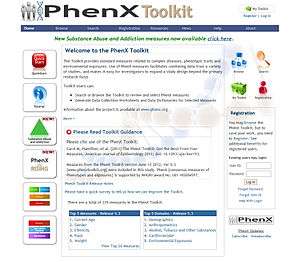PhenX Toolkit
The PhenX Toolkit is a web-based catalog of high-priority measures related to complex diseases, phenotypic traits and environmental exposures. These measures were selected by working groups of experts using a consensus process.[1] Use of PhenX measures facilitates combining data from a variety of studies, and makes it easy for investigators to expand a study design beyond the primary research focus.[2][3] The Toolkit is funded by the National Institute of Health's National Human Genome Research Institute (NHGRI) with co-funding by the Office of Behavioral and Social Sciences Research (OBSSR) and the National Institute on Drug Abuse (NIDA).[4] Supplemental funding is provided by the National Heart, Lung, and Blood Institute (NHLBI) and the National Institute on Minority Health and Health Disparities (NIMHD).[5] The PhenX Toolkit is available to the scientific community at no cost.
Screenshot  Screenshot of the website as of August 2012 | |
Type of site | Content Site |
|---|---|
| Available in | English |
| Owner | NHGRI |
| Created by | RTI International |
| Website | www |
| Commercial | no |
| Registration | Optional |
| Users | 2700+ Registered, 1M+ visits |
| Launched | 6 February 2009 |
| Current status | Active |
Content license | Public Domain |
For genome-wide association studies (GWAS) and other studies involving human subjects, the use of standard measures can facilitate cross-study analyses.[6][7] Such analyses compare independent findings to validate results or combine studies to increase sample size and statistical power. This increased power makes it possible to identify more subtle and complex associations such as gene-gene and gene-environment interactions.[8][9][10][11]
The Toolkit provides assessments for 24 research domains. In addition to measures, PhenX also defines protocols. There may be multiple protocols defined for a measure. For example, for smoking cessation, there is an adult protocol and adolescent protocol. PhenX also provides a datatype (e.g., integer, string, date, enumerated, or encoded values) for each PhenX variable.
See also
- Patient-Reported Outcomes Measurement Information System
- Health informatics
- Redcap (Research Electronic Data Capture)
- LOINC
References
- Maiese DR, Hendershot TP, Strader LC, et al. (2013). PhenX—Establishing a consensus process to select common measures for collaborative research (Technical report). Research Triangle Park, NC: RTI Press. doi:10.3768/rtipress.2013.mr.0027.1310. MR-0027-1310.
- Hamilton CM, Strader LC, Pratt JG, et al. (1 August 2011). "The PhenX Toolkit: Get the Most From Your Measures". American Journal of Epidemiology. 174 (3): 253–260. doi:10.1093/aje/kwr193. PMC 3141081. PMID 21749974.
- Hendershot T, Pan H, Haines J, et al. (October 2011). "Using the PhenX Toolkit to Add Standard Measures to Your Study". Current Protocols in Human Genetics. 1 (21). Unit 1.21. doi:10.1002/0471142905.hg0121s71. PMID 21975939.
- "A research toolkit of standard measures to be expanded to further support the biomedical community". RTI International. September 28, 2017. Retrieved 9 May 2018.
- Eckman, JR; et al. (December 26, 2017). "Standard measures for sickle cell disease research: the PhenX Toolkit sickle cell disease collections" (PDF). Blood Advances. 1 (27): 2703–2711. doi:10.1182/bloodadvances.2017010702 (inactive 2019-08-20). PMC 5745137. PMID 29296922. Retrieved 9 May 2018.
- Pan H, Tryka KA, Vreeman DJ, et al. (May 2012). "Using PhenX Measures to Identify Opportunities for Cross-Study Analysis". Human Mutation. 33 (5): 849–857. doi:10.1002/humu.22074. PMC 3780790. PMID 22415805.
- Manolio TA (February 2009). "Collaborative Genome-wide Association Studies of Diverse Diseases: Programs of the NHGRI's Office of Population Genomics". Pharmacogenomics. 10 (3): 235–241. doi:10.2217/14622416.10.2.235. PMC 2714942. PMID 19207024.
- Barrett JC, Hansoul S, Nicolae DL, et al. (August 2008). "Genome-wide association defines more than 30 distinct susceptibility loci for Crohn's disease". Nature Genetics. 40 (8): 955–962. doi:10.1038/ng.175. PMC 2574810. PMID 18587394.
- Barrett JC, Clayton DG, Concannon P, et al. (June 2009). "Genome-wide association study and meta-analysis find that over 40 loci affect risk of type 1 diabetes" (PDF). Nature Genetics. 41 (6): 703–707. doi:10.1038/ng.381. PMC 2889014. PMID 19430480.
- Cooper JD, Smyth DJ, Smiles AM, et al. (December 2008). "Meta-analysis of genome-wide association study data identifies additional type 1 diabetes risk loci". Nature Genetics. 40 (12): 1399–1401. doi:10.1038/ng.249. PMC 2635556. PMID 18978792.
- Hunter DJ (April 2005). "Gene-environment Interactions in Human Diseases". Nature Reviews Genetics. 6 (4): 287–298. doi:10.1038/nrg1578. PMID 15803198.